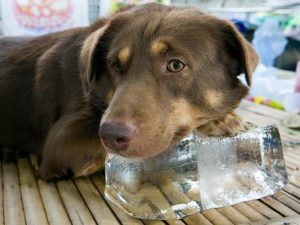Body temperature may be elevated because of an infection (fever), but it may also increase because of hot and/or humid conditions outside. An increased body temperature caused by environmental conditions is commonly referred to as hyperthermia, heatstroke, and heat prostration.
Hyperthermia may be a life-threatening condition, and does require immediate treatment. A dog’s normal body temperature is 101.5°F plus or minus 1 degree Fahrenheit, and any time the body temperature is higher than 105°F, a true emergency exists. Heatstroke generally occurs in hot summer weather when dogs are left with inadequate ventilation in hot vehicles. However, heatstroke may also occur in other conditions, including:
- When an animal is left outdoors in hot/humid conditions without adequate shade.
- When exercised in hot/humid weather.
- When left in a car on a relatively cool (70°F) day; a recent study from Stanford University Medical Center found the temperature within a vehicle may increase by an average of 40 degrees Fahrenheit within one (!) hour regardless of outside temperature.
Other predisposing factors may be obesity and/or diseases affecting a pet’s airway. Keep in mind that prolonged seizures, eclampsia (milk fever), poisonings, and many other conditions may cause hyperthermia. Also, brachycephalic (short-nosed) breeds (Pekingese, Pug, Lhasa apso, Boston terrier, etc.) may suffer from ineffectual panter syndrome that results in an increased body temperature that may be fatal.
Initially the pet appears distressed, and will pant excessively and become restless. As the hyperthermia progresses, the pet may drool large amounts of saliva from the nose and/or mouth. The pet may become unsteady on his feet. You may notice the gums turning blue/purple or bright red in color, which is due to inadequate oxygen.
What to Do
- Remove your pet from the environment where the hyperthermia occurred.
- Move your pet to shaded and cool environment, and direct a fan on her.
- If possible, determine rectal temperature and record it.
- Begin to cool the body by placing cool, wet towels over the back of the neck, in the armpits, and in the groin region. You may also wet the ear flaps and paws with cool water. Directing a fan on these wetted areas will help to speed evaporative cooling. Transport to the closest veterinary facility immediately.
What NOT to Do
- Do not overcool the pet.
- Most pets with hyperthermia have body temperatures greater than 105°F, and a reasonable goal of cooling is to reduce your pet’s body temperature to 102.5-103°F while transporting her to the closest veterinary facility.
- Do not attempt to force water into your pet’s mouth, but you may have fresh cool water ready to offer should your pet be alert and show an interest in drinking.
- Do not leave your pet unattended for any length of time.
Rapidly cooling the pet is extremely important. Cold tap water is suitable.
Severe hyperthermia is a disease that affects nearly every system in the body. Simply lowering the body temperature fails to address the potentially catastrophic events that often accompany this disorder. A pet suffering from hyperthermia should be seen by a veterinarian as soon as possible.
Houston Heights Veterinary Clinic
Urban Animal Veterinary Hospital wants the best for you and your pets! Make sure your animals stay hydrated and healthy all Spring and Summer!



